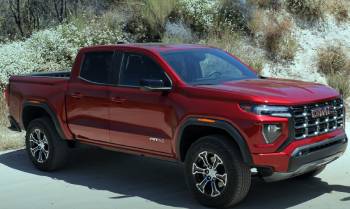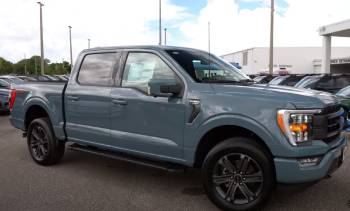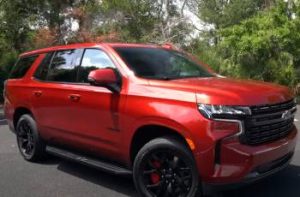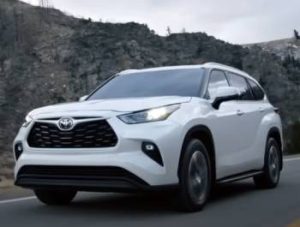In the sprawling kingdom of pickup trucks, two names often come to the fore – the GMC Canyon and the Ford F-150. Both these trucks enjoy an esteemed position in the automotive world.
Whether you’re in the market for a new pickup or just an auto enthusiast, this comprehensive guide will break down the pros and cons of each, optimizing your knowledge on the “GMC Canyon and Ford F-150.”
Comparison Table: GMC Canyon and Ford F-150
| Feature/Aspect | GMC Canyon | Ford F-150 |
| Size | Midsize Pickup | Full-size Pickup |
| Length | 212 – 225 inches | 209 – 251 inches |
| Engine Options | 2.5L 4-cylinder, 3.6L V6, 2.8L turbo diesel | Ranges from 3.3L V6 to 5.0L V8, including hybrid |
| Towing Capacity | Lower than F-150 (varies by engine & configuration) | Substantially higher (varies by engine & config) |
| Interior | Upscale, especially in Denali | Luxurious in higher trims, tech-rich |
| Price Range | Affordable to high-end (based on trim) | Wide range, from basic to luxury pricing |
| Safety | Good safety features, decent ratings | Advanced safety suite, historically robust ratings |
GMC Canyon: Strengths and Drawbacks

Pros of GMC Canyon:
- Compact Size
For city dwellers, the GMC Canyon offers the perks of a truck without the intimidating size. Its size ensures easy parking and navigating through tight spots.
- Fuel Efficiency
Compared to larger pickups, the Canyon often boasts better fuel efficiency, making it lighter on the wallet in the long run.
- Upscale Interiors
The Canyon offers an unexpectedly luxurious interior for its segment, with quality materials and user-friendly tech features.
Cons of GMC Canyon:
- Towing Capacity
While sufficient for many tasks, the Canyon’s towing capacity doesn’t measure up to some larger rivals like the Ford F-150.
- Limited Bed Size
Its compact nature means the bed size can’t accommodate as much as larger trucks.
- Price
Surprisingly, some trims of the Canyon can get quite expensive, diminishing its value proposition.
Read More: About Alta Window Fashions And Hunter Douglas
Ford F-150: The Legendary Pickup

Pros of Ford F-150:
- Towing Powerhouse
The F-150 is often heralded as the towing champ in its class, making it perfect for heavy-duty tasks.
- Versatile Engine Options
From V6s to V8s and even a hybrid, the Ford F-150 provides an engine for every need.
- Innovative Features
Ford has ensured the F-150 is cutting edge with features like an onboard generator, fold-flat workspace, and more.
Cons of Ford F-150:
- Size
Its large dimensions can make the F-150 a handful in congested urban areas.
- Fuel Efficiency
With great power comes…not-so-great fuel efficiency. Larger engines can be thirsty.
- Initial Cost
The price tag, especially for the higher trims, can be a deterrent for some.
Key Differences Between GMC Canyon and Ford F-150
The GMC Canyon and the Ford F-150, while both falling under the umbrella of pickup trucks, cater to different niches within the segment. Let’s dive deeper into their key differences.
1. Size & Dimension
- GMC Canyon:
The GMC Canyon, belonging to the midsize pickup segment, is compact and designed for maneuverability. This makes it easier to handle in congested urban areas. Typically, its length ranges between 212 to 225 inches, depending on the specific configuration. - Ford F-150:
The Ford F-150 is a full-sized pickup, substantially larger than the Canyon. Its length can vary from about 209 inches to 251 inches, based on the specific model and bed length you opt for. Its size translates into a roomier cabin and a more extensive bed.
2. Performance & Capability
- GMC Canyon:
The Canyon offers a range of engines from a 2.5L 4-cylinder to a 3.6L V6, and even a 2.8L turbo diesel. While these engines are efficient and suitable for daily tasks, they don’t offer the same power and towing capability as some larger pickups. - Ford F-150:
The F-150 boasts a broader spectrum of engine options. From the 3.3L V6 to the powerful 5.0L V8 and the 3.5L EcoBoost, there’s an engine for every need. There’s even a hybrid option. These engines provide a higher towing and payload capacity, making the F-150 a workhorse in every sense.
3. Interior & Features
- GMC Canyon:
The Canyon surprises many with its upscale interior. Premium trims like the Denali bring in leather upholstery, advanced infotainment systems, and more. It offers a comfortable and relatively luxurious ride for its segment. - Ford F-150:
The F-150, especially in its higher trims like the King Ranch, Platinum, and Limited, screams luxury. Ford’s SYNC4 infotainment system, large touchscreens, premium audio systems, and a plethora of advanced tech features make the cabin a tech-lover’s dream.
4. Price & Value Proposition
- GMC Canyon:
The Canyon, in its base trims, offers a more affordable entry point. However, prices can escalate quickly as you go up the trim ladder, especially with the Denali. It’s a balance of luxury and practicality but can seem pricey for a midsize pickup. - Ford F-150:
The F-150 has a broad price spectrum. The base models are reasonably priced for a full-sized pickup, but higher trims can venture into luxury car territory. However, given its capabilities, features, and brand legacy, many find the value proposition compelling.
5. Safety & Reliability
- GMC Canyon:
The Canyon has garnered good safety ratings in the past, with features like forward collision warning and lane departure warning. In terms of reliability, while there have been certain model years with concerns, it generally stands as a reliable midsize truck. - Ford F-150:
Ford has consistently invested in the safety of the F-150. With the Ford Co-Pilot360 suite, it offers a range of advanced safety features. Historically, the F-150 has had a strong reputation for reliability, making it a favorite among many truck enthusiasts.
Also Read: Is Armor All SmartShield Worth It?
FAQ Section
The Ford equivalent to the GMC Canyon in terms of size and market segment is the Ford Ranger.
Yes, the GMC Canyon has generally received positive reviews for its reliability, although, like any vehicle, it’s essential to maintain it properly.
The GMC Sierra, especially the larger 1500 series, is more directly comparable to the Ford F-150 in terms of size, capabilities, and market positioning.
The GMC Canyon and Ford Ranger are pretty comparable in size. However, exact dimensions can vary depending on the model year and configuration.
As of my last training data in September 2021, GM had not announced any plans to discontinue the GMC Canyon. However, automakers’ decisions can change based on market dynamics, so it’s a good idea to check the latest from GMC or GM’s official channels.
The GMC Canyon, especially in its higher trims, offers a range of luxury and tech features, which can drive up the cost. Additionally, brand positioning, demand, and other market factors can influence its pricing.
Conclusion
Choosing between the GMC Canyon and the Ford F-150 boils down to individual needs and preferences. While the Canyon offers urban practicality and luxury, the F-150 stands tall as a heavy-duty workhorse. So, are you a city slicker looking for a touch of ruggedness, or do you need a truck that’s all about power and capability? The choice is yours!
In conclusion, while both trucks cater to the pickup market, they serve different needs. The GMC Canyon is for those who want truck capabilities without the size, while the Ford F-150 is the go-to for those seeking power, size, and legacy. Your choice will largely depend on your needs, budget, and brand preference.



